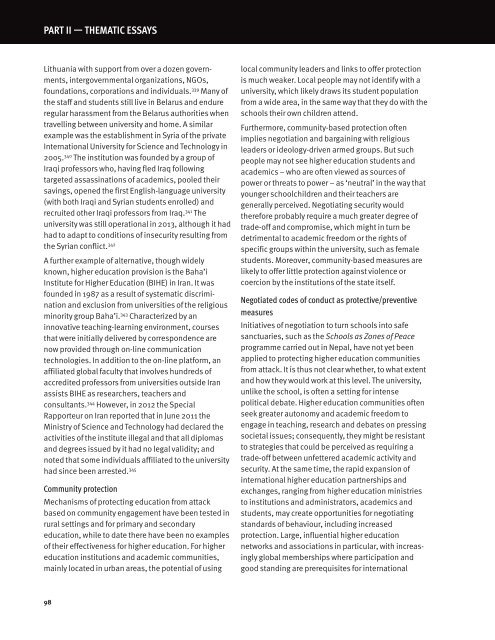eua_2014_full.pdf?utm_content=buffer4a392&utm_medium=social&utm_source=twitter
eua_2014_full.pdf?utm_content=buffer4a392&utm_medium=social&utm_source=twitter
eua_2014_full.pdf?utm_content=buffer4a392&utm_medium=social&utm_source=twitter
- No tags were found...
You also want an ePaper? Increase the reach of your titles
YUMPU automatically turns print PDFs into web optimized ePapers that Google loves.
PART II — THeMATIC eSSAYSLithuania with support from over a dozen governments,intergovernmental organizations, NGOs,foundations, corporations and individuals. 339 Many ofthe staff and students still live in Belarus and endureregular harassment from the Belarus authorities whentravelling between university and home. A similarexample was the establishment in Syria of the privateInternational University for Science and Technology in2005. 340 The institution was founded by a group ofIraqi professors who, having fled Iraq followingtargeted assassinations of academics, pooled theirsavings, opened the first English-language university(with both Iraqi and Syrian students enrolled) andrecruited other Iraqi professors from Iraq. 341 Theuniversity was still operational in 2013, although it hadhad to adapt to conditions of insecurity resulting fromthe Syrian conflict. 342A further example of alternative, though widelyknown, higher education provision is the Baha’iInstitute for Higher Education (BIHE) in Iran. It wasfounded in 1987 as a result of systematic discriminationand exclusion from universities of the religiousminority group Baha’i. 343 Characterized by aninnovative teaching-learning environment, coursesthat were initially delivered by correspondence arenow provided through on-line communicationtechnologies. In addition to the on-line platform, anaffiliated global faculty that involves hundreds ofaccredited professors from universities outside Iranassists BIHE as researchers, teachers andconsultants. 344 However, in 2012 the SpecialRapporteur on Iran reported that in June 2011 theMinistry of Science and Technology had declared theactivities of the institute illegal and that all diplomasand degrees issued by it had no legal validity; andnoted that some individuals affiliated to the universityhad since been arrested. 345Community protectionMechanisms of protecting education from attackbased on community engagement have been tested inrural settings and for primary and secondaryeducation, while to date there have been no examplesof their effectiveness for higher education. For highereducation institutions and academic communities,mainly located in urban areas, the potential of usinglocal community leaders and links to offer protectionis much weaker. Local people may not identify with auniversity, which likely draws its student populationfrom a wide area, in the same way that they do with theschools their own children attend.Furthermore, community-based protection oftenimplies negotiation and bargaining with religiousleaders or ideology-driven armed groups. But suchpeople may not see higher education students andacademics – who are often viewed as sources ofpower or threats to power – as ‘neutral’ in the way thatyounger schoolchildren and their teachers aregenerally perceived. Negotiating security wouldtherefore probably require a much greater degree oftrade-off and compromise, which might in turn bedetrimental to academic freedom or the rights ofspecific groups within the university, such as femalestudents. Moreover, community-based measures arelikely to offer little protection against violence orcoercion by the institutions of the state itself.Negotiated codes of conduct as protective/preventivemeasuresInitiatives of negotiation to turn schools into safesanctuaries, such as the Schools as Zones of Peaceprogramme carried out in Nepal, have not yet beenapplied to protecting higher education communitiesfrom attack. It is thus not clear whether, to what extentand how they would work at this level. The university,unlike the school, is often a setting for intensepolitical debate. Higher education communities oftenseek greater autonomy and academic freedom toengage in teaching, research and debates on pressingsocietal issues; consequently, they might be resistantto strategies that could be perceived as requiring atrade-off between unfettered academic activity andsecurity. At the same time, the rapid expansion ofinternational higher education partnerships andexchanges, ranging from higher education ministriesto institutions and administrators, academics andstudents, may create opportunities for negotiatingstandards of behaviour, including increasedprotection. Large, influential higher educationnetworks and associations in particular, with increasinglyglobal memberships where participation andgood standing are prerequisites for international98


